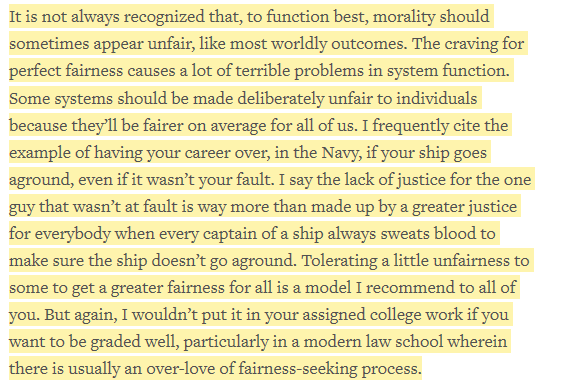This Navy captain letter story is incredibly fasinating
"Trump says Navy captain letter asking for help on coronavirus-stricken ship ‘was terrible’" https://www.cnbc.com/2020/04/04/trump-says-navy-captain-letter-asking-for-help-on-coronavirus-stricken-ship-was-terrible.html">https://www.cnbc.com/2020/04/0...
"Trump says Navy captain letter asking for help on coronavirus-stricken ship ‘was terrible’" https://www.cnbc.com/2020/04/04/trump-says-navy-captain-letter-asking-for-help-on-coronavirus-stricken-ship-was-terrible.html">https://www.cnbc.com/2020/04/0...
My Take:
Munger has often used the example of a Navy ship going aground to describe Kantian Fairness Tendency
Basically, the world isn& #39;t fair for some people, but It& #39;s okay if a situation is unfair for SOME individuals if the end result is positive for "the average"
Munger has often used the example of a Navy ship going aground to describe Kantian Fairness Tendency
Basically, the world isn& #39;t fair for some people, but It& #39;s okay if a situation is unfair for SOME individuals if the end result is positive for "the average"
The captain of a Navy ship is responsible for everything - good or bad.. period, end of story
If a ship goes aground and it& #39;s not the captain& #39;s fault, he& #39;s still done
What this does is it creates a strong incentive structure for the captain to have things move smoothly
If a ship goes aground and it& #39;s not the captain& #39;s fault, he& #39;s still done
What this does is it creates a strong incentive structure for the captain to have things move smoothly
This potential career-ending system may suck for the captain, but if it& #39;s better for the rest of the ship, then in some ways it& #39;s fair....
moving on
Of course, going against/around the chain of command in the Navy is absolutely frowned upon
moving on
Of course, going against/around the chain of command in the Navy is absolutely frowned upon
This captain knew what the consequences were and what he was doing when he sent the letter
He knew he was sacrificing his career
This just shows how serious he thought all of it was..
Yet, he still did what he thought had to be done to protect his sailors
He knew he was sacrificing his career
This just shows how serious he thought all of it was..
Yet, he still did what he thought had to be done to protect his sailors
“We are not at war. Sailors do not need to die. If we do not act now, we are failing to properly take care of our most trusted asset — our Sailors,” Crozier wrote in the letter
“The spread of the disease is ongoing and accelerating.”
“The spread of the disease is ongoing and accelerating.”
IMO this captain is a hero and this is Kantian Fairness Tendency in a different perspective
"Some systems should be made deliberately unfair to individuals because they’ll be fairer on average for all of us"
Hats off to this captian... Hooyah
"Some systems should be made deliberately unfair to individuals because they’ll be fairer on average for all of us"
Hats off to this captian... Hooyah

 Read on Twitter
Read on Twitter


